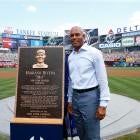There are numberless absurdities to the Baseball Writers Association of American Hall of Fame voting process, and this is perhaps foremost among them: There's never been a unanimous Hall of Fame selection.
In a way, this most relentless and foolish of streaks traces way back yonder to the first Hall of Fame class of 1936. Here's who made the cut, with their respective ballot percentages:
- Ty Cobb, 98.2 percent
- Babe Ruth, 95.1 percent
- Honus Wagner, 95.1 percent
- Christy Mathewson, 90.7 percent
- Walter Johnson, 83.6 percent
While voters of the day were operating without roadmap or precedent, it's something to imagine surveying the bestowals of any of those five names and finding them not worth of induction, as multiple voters did in each case. That puzzling seminal moment begat what followed. Even indisputably obvious Hall of Famers like Hank Aaron, Willie Mays, Stan Musial and Ted Williams weren't named on every ballot in large measure because, as the thinking (such as it is) went, "if the Babe didn't get 100 percent, then this guy won't."
We're still waiting for a player to be named on every ballot. Presumably one day it will happen. Back in 2016, Ken Griffey Jr. set the record by being named on 99.3 percent of ballots. That's a lofty figure, certainly, but it also means he wasn't named on three ballots.
At some point, presumably, the arc of history will bend toward common sense and an unassailable Hall of Famer will be treated as such. Perhaps that happens as soon as next year, now that Mariano Rivera is one of the 20 new names on the BBWAA ballot?
Well, probably not. First, yes, Rivera thanks to his most-ever 652 saves, highest-ever 205 ERA+ (minimum 1,000 career innings), legendary postseason resume, and sterling reputation, will be going in on the first ballot with ease. That said, showing up on each and every ballot seems unlikely.
First, there's the fact that Rivera is a reliever, and voters haven't quite figured out how to handle those yet. Among primary relievers, Goose Gossage has the highest ballot percentage. He was named on 85.8 percent of ballots in 2008, but that was his ninth year on the ballot. Trevor Hoffman, who's so often associated with Rivera (although Rivera has a much stronger case), didn't make it in until his third year on the ballot, and even then he failed to crack 80 percent.
Only one player inducted as a reliever made it on the first ballot, and that was Dennis Eckersley in 2004 with 83.2 percent of the vote. Eckersley, though, was really in part a hybrid candidate. He made 361 starts in his career, pitched more than 75 percent of his career innings as a starter, and logged 149 of his 197 wins as a starter. Yes, he was a far better closer than he was starting pitcher, but his work as a starter no doubt added to his Hall of Fame case.
Again, Rivera is going to sail in on the first ballot and top 90 percent, and that's deserved, especially by the existing Hall of Fame standards for closers. On the other hand, some voter or three will blanch at the idea of making a reliever the first unanimous choice. Others may eyeball Rivera's career WAR of 56.3 and find it wanting. To be sure, comparing relievers to starters on the basis of WAR isn't a sound choice, but you can plausibly argue that even great closers are less valuable than merely good starters.
In the end, we're talking about unanimity, and it only takes one no vote to eliminate the possibility of it. It says here that at least one voter will find the rationale he or she needs to pass on Rivera on the first ballot. That, then, would clear the decks for Rivera's longtime teammate Derek Jeter to become the first unanimous selection in 2020.
But that's a topic for another day.


















